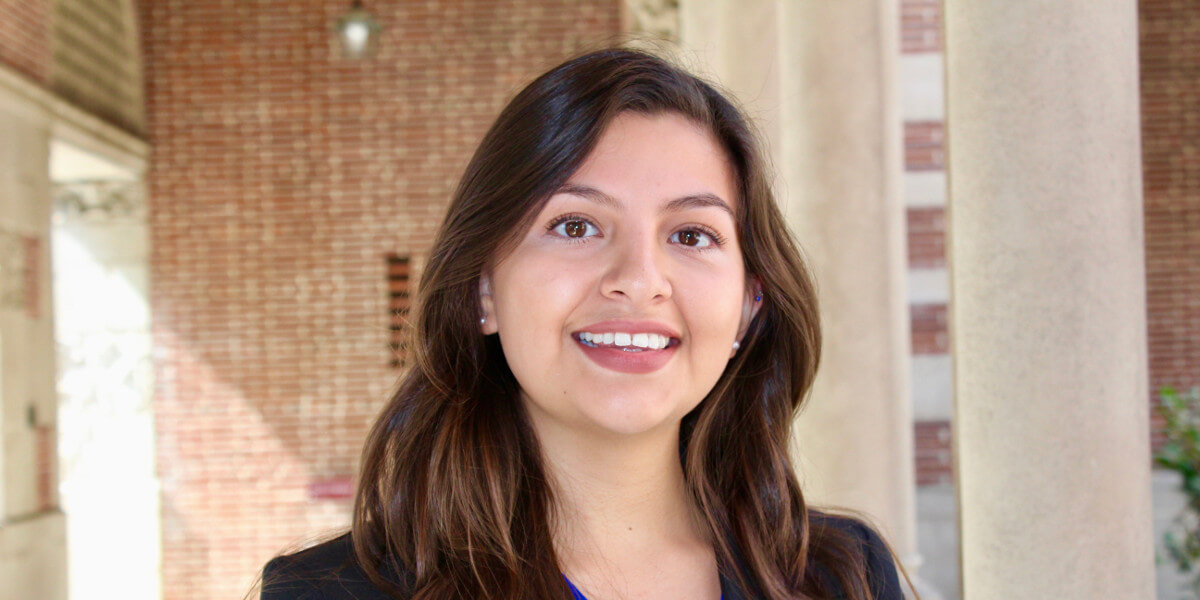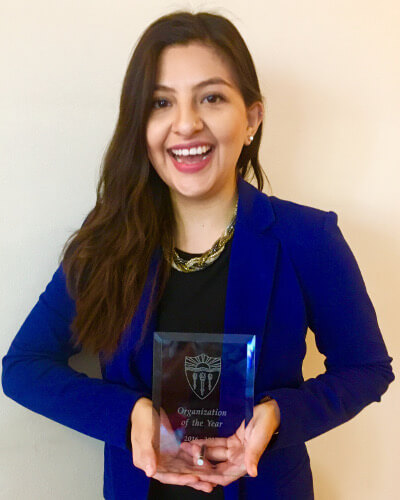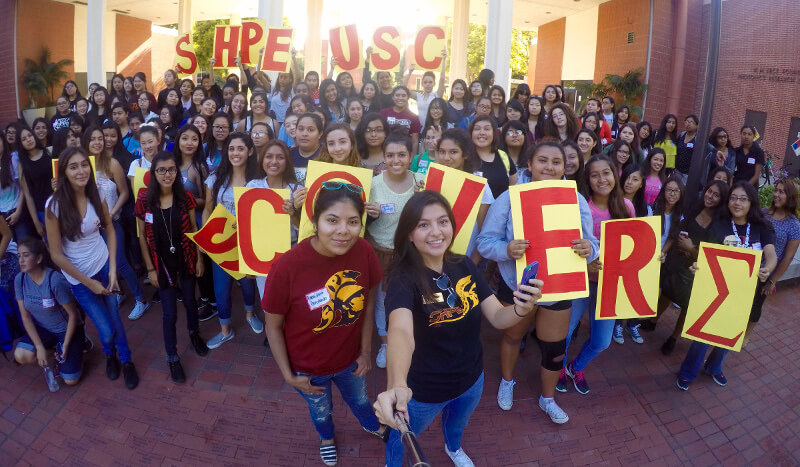
Daisy Benitez. Photo/Daisy Benitez
“Work with your mind, not with your hands.” Recent graduate Daisy Benitez grew up hearing these words so often it became her mantra. In fact, her life was shaped by this saying and by the lives of its authors: her parents.
As a first-generation college student, Benitez was determined to build a future that her parents once dreamed of. After earning a bachelor’s degree in environmental engineering (’17), she will continue her work in sustainability through the Master in Green Technologies program, with her graduate studies funded by the National GEM Consortium Engineering Fellowship, the American Association of University Women (AAUW) Fellowship, and the Switzer Environmental Fellowship.
A better world

Daisy Benitez, president of the Society of Hispanic Professional Engineers, poses with her award for 2016-2017 Organization of the Year from USC. Photo/Daisy Benitez
When choosing a college major, Benitez’s love of math and science, coupled with her passion for helping people, led her to environmental engineering. In just four years at USC, through classes, research and internships, she learned about the relationship between energy production and the environment, novel methods for treating wastewater, and the air quality regulation process.
Through earning a master’s degree in green technologies, her goal is to provide support for the development of technologies for safe, sustainable and reliable energy generation that minimizes the negative impacts often burdened by marginalized, low-income communities.
This summer, as part of the Department of Energy’s Mickey Leland Energy Fellowship Program, she worked at the Los Alamos National Laboratory in New Mexico where her focus was on the risks associated with removing carbon-dioxide from the atmosphere and storing it in deep, underground saline reservoirs, a process used to slow the accumulation of greenhouse gases and reduce climate change impacts.
“I was looking at this technique called active reservoir management – that’s a way to mitigate changes in pressure in reservoirs when injecting carbon-dioxide by also producing brine in order to reduce leakage of carbon-dioxide or brine,” Benitez explained. “Because my background during undergrad was so heavy into ground water, water quality and water treatment, I decided to focus on how those risks could affect overlying groundwater aquifers.”
She plans to continue this research through her graduate studies by assessing the life-cycle of brine production and the possibility of treating brine for use in industry, agriculture, or even for drinking water.
An enriching community
Benitez credits her accomplishments to not only her parents’ never-ending encouragement, but also to the second-home that she found at USC: The Society of Hispanic Professional Engineers (SHPE), a national organization that provides academic and professional support.

Daisy Benitez (center-right) with a group of high schoolers during SHPE’s Women Discover Engineering Day. Photo/Daisy Benitez
“I got involved with SHPE my freshman year and it really helped ease my transition into college and put me on a path to success, to graduation, and to having a good number of internships and experience once I graduated,” she said. “It’s ultimately what got me interested in applying to graduate school.”
As the first member of her family to earn an undergraduate degree, Benitez never even considered attending graduate school. For one, she didn’t know if she could afford it coming from a low-income household, and two, not many of her friends gave graduate school much thought. It wasn’t until last year when Benitez was elected the SHPE student chapter president that the club started encouraging its members to pursue graduate degrees.
“It’s really a national problem – not having Latinos go to graduate school,” Benitez said. “It’s a very, very small percentage that goes to graduate school for a master’s, but it’s even smaller for PhD.”
According to the U.S. Census Bureau, while 12 percent of white Americans, 8 percent of black Americans, and 21 percent of Asian-Americans over the age of 25 have earned an advanced degree, only 5 percent of Hispanic-Americans have attained a graduate degree. Now that she is the SHPE regional graduate student representative for Southern California, Arizona and Nevada, she has made it one of her top priorities to make sure student chapters are promoting graduate school and educating its members on the application process and available resources.
A family first

Daisy Benitez at the 2017 undergraduate graduation ceremony with her mother, Martha, and father, Rafael. Photo/Daisy Benitez
Benitez’s passion for education comes directly from her parents, Rafael and Martha Benitez. After the 1985 earthquake in Mexico destroyed the university Rafael was planning to attend, they came to the U.S. seeking other opportunities. After working hard labor in the California agriculture industry, they eventually moved to Dallas, where they reside today.
Growing up, Benitez was continuously encouraged by them to pursue an education and go to college. So much so, that it was never a question of “if” but more simply, “where”.
“They didn’t always understand what I was doing in terms of academics, but they would always make sure I was doing my homework and that I was going to school. It just became something that I knew I had to do because, ultimately, I wanted to have a better future for myself,” said Benitez. “And so, I went through middle school and high school knowing that I was going to go to college. I didn’t know if I was going to go to the best college, but I knew I was going to go to college, that I was going to get an education, and like my dad said, I was going to work with my mind and not my hands.”
Published on August 16th, 2017
Last updated on August 16th, 2017







